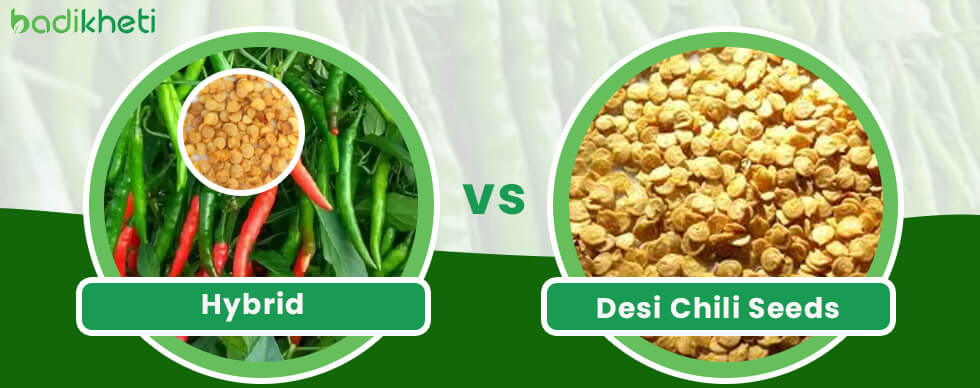
The chili (Mirch – मिर्च) has been a staple crop in India for centuries. However, in recent decades, introducing hybrid chili seeds has sparked a debate among Indian farmers. Should they stick to traditional desi chili varieties or adopt the new hybrids?
Here are some key considerations when navigating the world of hybrid and traditional chili seeds in India:
One major advantage of hybrid chili seeds is their substantially higher yield potential. Hybrids have been bred specifically for increased productivity. On average, hybrid chilies produce 30-50% higher yields per acre compared to traditional desi varieties. For farmers in India looking to maximize production on limited land, hybrid seeds of Chili seem like an obvious choice.
However, higher yield doesn’t tell the whole story. Desi chilies typically require fewer chemical inputs and are more resilient to pest attacks. The yield gap can be narrowed down when organic methods are used. Hybrid seeds must be repurchased each season, while desi chili seeds can be saved and re-used.
Traditional desi chilies often fetch a higher price in India’s local markets than hybrids. Customers perceive desi varieties of chilies like कश्मीरी मिर्च (Kashmiri lal mirch), तेजपुरिया (Tezpuria), गुंटूर (Guntur), and ब्याडगी (Byadgi) as more flavorful and aromatic. Their heat levels suit local palates.
However, hybrids meet export market requirements more easily. Their larger, more uniform fruits are preferred for stuffing, powders, and paprika. Hybrid chili production is on the rise to meet the needs of global supply chains.
Nevertheless, BadiKheti offers the best agriculture ecommerce platform to buy varieties of chili seeds online. You can find a vast selection of quality seeds from top Indian brands and manufacturers. They stock multiple chili seed varieties. Any farmer can find chili seeds that suit their needs.
Lack of genetic diversity makes hybrid chilies vulnerable to evolving pest and disease pressures. In contrast, traditional desi chili varieties have acquired natural resistance over centuries of cultivation in diverse environments.
Farmers in India have observed that desi types of chilies like लंका (Lanka) and छौसा (Chausa) hold up better against viral diseases like बुड़नेकारोग (wilting), fungi like धूलिकापत (powdery mildew), and pests like थ्रिप्स (thrips). However, targeted breeding efforts are improving the resilience of hybrids.
India’s changing climate poses new challenges for chili cultivation. Traditional varieties evolved in specific microclimates and may struggle under a typical weather.
Early-maturing hybrid chili seeds with shorter field duration can help farmers beat climate uncertainties. Quicker crop cycles limit excess rainfall, heat waves, or drought exposure.
However, quick maturation gives less time to develop full aroma and heat. Again, there are always advantages and disadvantages to evaluate.
The main downside of hybrid chili seeds is their high cost compared to desi varieties. Multinational seed companies invest heavily in R&D and pass these costs to farmers. Local traditional seeds can be saved cheaply from season to season.
Many small-holder Indian farmers struggle to access expensive hybrid chili seeds. Those without capital get caught in debt traps trying to finance input costs. In addition, steadily declining prices and government subsidies are improving accessibility.
However, BadiKheti serves as an online platform to avail traditional chili seeds. It maintains a broad range of first-rate chili seeds for its customers. Ensuring access to the finest products in the market is their highest priority.
Usage of the hybrid and non-hybrid desi chili seeds for chili farming depends on individual farmer’s priorities, market opportunities, and local growing conditions.
By weighing yield potential, input costs, marketability, climate resilience, and pest/disease factors, Indian farmers can make informed choices about adopting hybrids versus nurturing traditional desi chili varieties connected to India’s culinary heritage.
If you are looking to buy quality seeds online, Badikheti is the place to go. They have an expansive assortment of excellent vegetable flower herb seeds. You can find them at reasonable prices and they have something to suit the needs of every Indian farmer.
Introduction Chilli fondly known as "Mirchi" in Hindi holds great cultural and historical significance in India. It is not merely a culinary delight but an integral part of our traditions with significant links to agriculture and daily life. India takes great pride in being one of the leading producers and consumers of chillies globally, with various regions contributing to this spicy farming. This article aims to analyze the primary states involved in chilli cultivation within India, exploring their unique functions within the flourishing chilli industry....
The Indian economy is based on agriculture, and the farmer's livelihood relies on the rain in monsoon season. But it isn’t certain, so depending entirely on it may affect soil management and agricultural yields. Crops need a proper quantity of water for their development. The only means our farmers can keep storing and using water properly is via irrigation. In this blog, we will understand the irrigation methods for excellent water management for Indian farmers. Undoubtedly, the world’s agricultural area has increased in the past,...
Spices constitute an essential element of Indian gastronomy, imparting richness, and piquancy to an array of recipes. Among them, a distinct position is held by chili peppers, which however face consistent threats from various diseases that can cause severe damage to crops. Disease-resistant chili seeds have lately emerged as a revolutionary alternative to safeguard chilli farming in India. This write-up explores the prospective benefits of these types of chilli seeds and their significant impact on the future of Indian spice agriculture. The predicament of diseases...